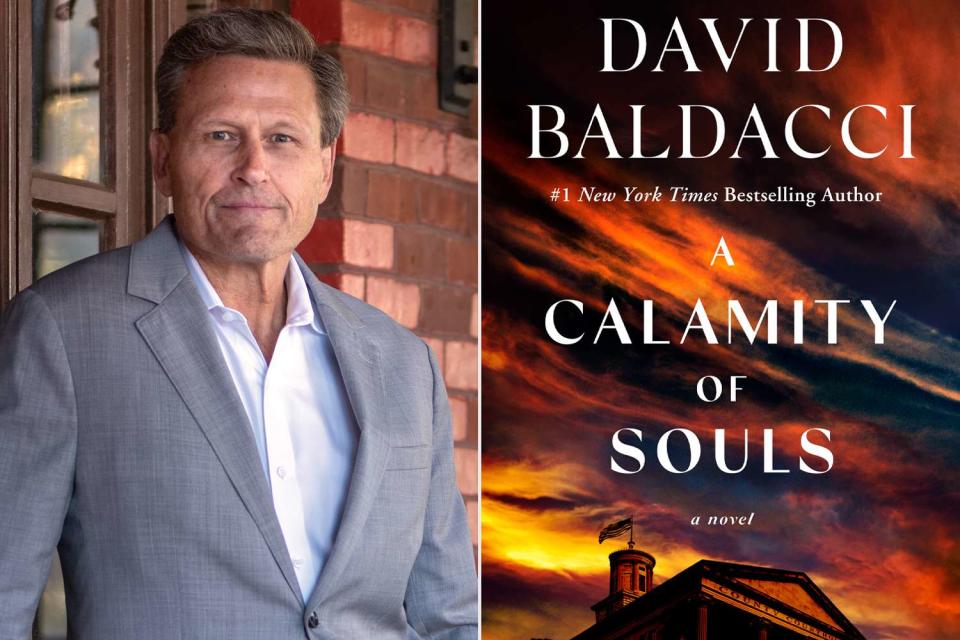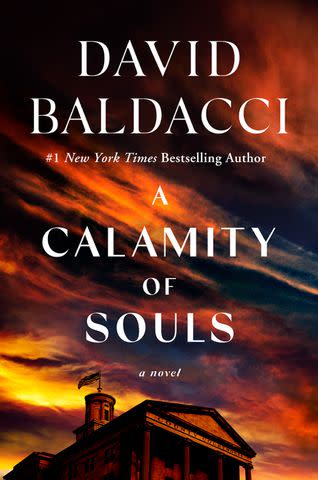David Baldacci's Latest Legal Thriller 'Takes on Deep-Seated Racism' — and Took a Decade to Write
The bestselling author's newest, 'Calamity of Souls' was partly inspired by Baldacci's own school integration experience

Grand Central Publishing; John Groo
David Baldacci and 'A Calamity of Souls'If I hadn’t grown up in the south, specifically in Richmond, Va., in the sixties and seventies, I doubt I could have conceived of or written A Calamity of Souls. The novel is a courtroom and family drama centered in Virginia in the tumultuous year of 1968, that takes on issues of deep-seated racism.
Although some of our southern brethren don’t consider Virginia technically part of the Deep South, the Confederate capital was located there, more Civil War battles were fought on Virginia soil than in any other state, the American slave trade began on its colonial shores, and we had, until recently, more Rebel statues than any other place on earth.
As a child, I often passed by these colossal and patinaed brass reminders of the South’s glorified past. I was taught in school that these men were heroes fighting for, if not their country, then a certain way of life; slavery was barely mentioned. I remember the scrawled signs for the toilets for Colored Women, as opposed to the dignified markers for the White Ladies Bathrooms. My world was divided into black and white, regardless of newly enacted laws or the Civil Rights Movement striving mightily to finally bring equality to what was supposed to be the world’s shining beacon of freedom. However, tugging people and attitudes along with the law is often a Sisyphean task.
I promised myself (and my daughter) that Calamity would not be a “savior” book, where one race swoops in to rescue another. I thus framed the relationship of the White lawyer, Jack Lee, and his Black counterpart, Desiree DuBose, along the lines of the uneasy bonds I formed in the sixth grade.

Grand Central Publishing
'A Calamity of Souls' by David BaldacciThat was when, in accordance with Brown v. Board, Virginia commenced integrating its schools, albeit nearly two decades after that monumental court decision. It was an unwieldy and fractious partnership, particularly for an immature gaggle of 12-year-olds. At the time, it felt as though adults had conceded they couldn’t figure out the race question and left it to the children to deal with. As you can imagine, it was not entirely smooth sailing.
In that sixth grade’s grand experiment, we were a calamity of souls, foreign objects from different planes of existence colliding with one another from odd angles and vastly divergent life experiences. There was anger, confusion and violence, a full panoply of emotional spectrums played out in that classroom, and simultaneously across the country, riven by equal parts bigotry and hatred, hope and resilience, smiles and tears.
And at least for me and my fellow sixth graders, friendships were formed and attitudes did change. Fears and prejudices faded away, not for all, not even for most, but for some. I met the families of some of my new friends and went to their homes to simply have fun. I learned about a part of the world that had been closed off to me. And when you’re throwing a ball or running through the woods or just telling tall tales in the backyard, it was startling how completely idiotic the notion of separate races became.
Related: Best Books by Black Authors to Celebrate Black History Month
It was a pivotal moment in my youth, and has stayed with me every minute of my life, enabling me to realize both the pitfalls and possibilities of this country and its people.
And while there is a lot of myself in trial attorney Jack Lee in Calamity, the finest lawyer in the novel by far is Desiree DuBose. For me, DuBose represents the legions of oppressed and frustrated women from that era, my mother included. I observed women from all walks of life having to work harder and sacrifice far more than men, and still not coming within a country mile of being recognized as an equal. Thus, DuBose is one of the necessary pillars in a story that required two people from different pasts, teachings and beliefs to come together to achieve something that would have been unreachable, alone.
Never miss a story — sign up for PEOPLE's free daily newsletter to stay up-to-date on the best of what PEOPLE has to offer , from celebrity news to compelling human interest stories.
Here we are today, over a half century later facing both new and old challenges. No one can deny that there is tremendous unrest and division over many difficult issues. Some claim it’s the worst it’s ever been. Hopelessness seems to pervade the collective bloodstream of the citizenry today.
But 1968 was no bed of roses. Civil Rights icon Dr. Martin Luther King, Jr. was murdered in April, and leading presidential candidate Robert Kennedy’s killing followed less than two months later. A terribly unpopular and divisive war was raging in southeast Asia. Protests and upheaval against the two men’s deaths, racial injustice and a war of false pretenses were ripping apart the nation’s very soul. And if that weren’t enough, George Wallace, an avowed white supremacist, was running for president and filling up venues across the country where he gave hate-filled stump speeches for his worshipful acolytes. He would later go on to carry five states and garner 10 million votes, all in the name of taking the country back a hundred years in time and dividing the races once more.
Related: A Look Back at the Long List of Kennedy Family Tragedies
And still, we survived all that and made progress as a people, as a country. Now, past performance is no indicator of future results, as the old legal disclaimer goes. However, in this arena, I believe that the past does matter, the past does hold answers and the past can clarify the way forward. And that way is together. It is the only way, in fact.
That conclusion may sound preposterously quaint to some, unwelcome advice to a few, ridiculous puffery or an impossible goal to still others. Yet after nearly 250 years of existence, which included a monarchy-shattering revolution heard around the world, a bloody civil war, an impoverishing depression and a global pandemic, we still stand as a nation forged from the unquenchable thirst for liberty.
Anyone familiar with American history knows that we are an independent and fiercely proud people often at loggerheads with one another. That is not always a bad thing. It only truly becomes destructive if the spirit of reconciliation, of a way forward, never comes. Now, darkness does indeed cast long shadows. And Lincoln warned his fellow Americans long ago that a house divided cannot long survive. That advice is as true today as when he uttered those words over 150 years ago.
While A Calamity of Souls contains heartache, pain and disappointment, it is also full of hope and showcases the resiliency of the human spirit and a way forward through the challenges that will continue to confront this country in the years ahead.
Calamities come and calamities go. However, we are not called the United States of America by mistake or happenstance. It’s who we’re supposed to be.
Together.
A Calamity of Souls is available April 16, wherever books are sold.
For more People news, make sure to sign up for our newsletter!
Read the original article on People.


